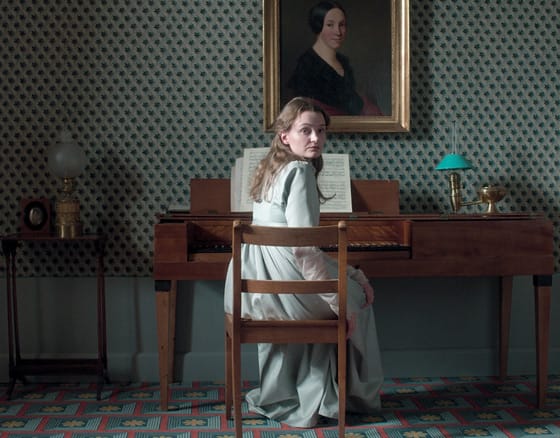Following the first public screening of her feature directorial debut, Lovely Rita, at TIFF back in 2001, Jessica Hausner invited questions from the audience, which was composed of about five people. The handful of questions all gravitated towards the same basic curiosity about what the intent of the rather opaque and unsentimental film was; there was a quiet judgment and challenge in the room from people angered that the film, about a teen girl trying to seduce a bus driver, didn't spell itself out.
Hausner, though seemingly meek and shy, spoke quite intelligently about the audience relationship with film, citing that her background was in psychology. Hausner, being curious about the language of film and how it placated its audience, wanted Lovely Rita to be a film of actions without explanation or reassurance. She wanted to explore our relationship with characters presented as we would normally observe them; without any montages or deliberately juxtaposed, telling, moments or music to guide our feelings.
With Amour Fou, her fourth (or, arguably, sixth, if you count 45-minute films as features) film, she continues to challenge the conventional presentation of cinema, using style and form to force the audience into a state of constant analysis (or dismissal) and hyper-awareness of the various elements comprising their viewing experience.
From the outset, there's something off about this semi-fictional story and period piece — 1810-1811 Berlin (the Romantic era), to be exact — about the double suicide of poet Heinrich von Kleist (Christian Friedel) and Henriette Vogel (Birte Schnoeink). Each shot, framed as an impeccable tableau, or cinematic representation of the "realism" that visual art at the time tried to present, is a little too perfect. The lighting exposes every fragment of any given room, which is typically divided into kaleidoscopic patterns of clashing wallpapers and carpets. The furniture is all flawless and sparsely placed, giving everything an overly sanitized, utilitarian feeling that suggests none of it has ever been used. Similarly, the starched and spotless costumes, all of which have strong contrast with the vibrantly coloured and designed sets, give them the impression of not being worn despite hanging from the actors, all of whom have the same passionless, lethargic mode of expressing themselves.
As Hausner notes in the interview supplement included with the Film Movement Blu-ray release, these sets were built in a warehouse. This wasn't because they couldn't find estates or environments to reflect early 19th Century Berlin; it was a controlling device to ensure everything seemed highly manufactured. It was also a mode of restricting her actors and reminding them of the intended artificiality of their performances. In addition to challenging what is conventionally accepted about the standard period piece, Amour Fou visualizes what artists were projecting as "reality" at the time, which ultimately distances the audience — as intended — to ensure we're conscious of the manufactured reality. This helps emphasize the central theme of this often dry, hilarious satire: the falsity of love.
Early on, characters openly speak their parts in an awkwardly candid, unapologetic manner. Heinrich asks his cousin directly if she will agree to a double-suicide so that the two can experience love and evade annihilation anxiety. Of course, the question is absurd, but the basic idea that the sincere motivations behind love are an impossibility driven by fear of dying alone — an inevitability — is what Hausner is chipping away at. This is reinforced by a deadpan comment made by Henriette while discussing the absurdity of giving the peasants freedom ("They want freedom just so they can pay taxes?" and "What would a serf even do with that freedom?"), wherein she notes that she has no desire for freedom as she is content in being the property of her husband, Stephan (Stephan Grossman).
Another theme introduced into this intriguingly cold dissertation on love is that of doubt. When Heinrich originally asks Henriette to commit suicide with him — after his cousin rejects his offer — he counters her assertion of happiness and love for her daughter with his perception of her misery and insincerity. Initially, she's shocked by this, not having questioned the seemingly idyllic life she has, but when she learns of potential illness, the doubt creeps up on her, similarly making her wonder about the possibility of dying with someone rather than alone.
Something consistent throughout the works of Jessica Hausner is an interest in the psychological motivations of someone that's seemingly quite fragile and diffident. Though Henriette seems like an easily manipulated airhead, there's an underlying stubbornness in her eventual decision that demonstrates strength in a less forthright and visible manner.
To some, a film about a seemingly weak character inhabited by actors that are discouraged to inject great depth into their characters as framed through a hyper-realized artificiality may not be ideal viewing material, but for those who enjoy being challenged and who want to read a film in a less conventional way, Amour Fou is wonderfully refreshing and highly effective as a cerebral comedy. With each film, Hausner becomes more assured and exact, crafting the sort of works that further the medium. And surely, she'll be recognized someday for the contribution she's making.
(Film Movement)Hausner, though seemingly meek and shy, spoke quite intelligently about the audience relationship with film, citing that her background was in psychology. Hausner, being curious about the language of film and how it placated its audience, wanted Lovely Rita to be a film of actions without explanation or reassurance. She wanted to explore our relationship with characters presented as we would normally observe them; without any montages or deliberately juxtaposed, telling, moments or music to guide our feelings.
With Amour Fou, her fourth (or, arguably, sixth, if you count 45-minute films as features) film, she continues to challenge the conventional presentation of cinema, using style and form to force the audience into a state of constant analysis (or dismissal) and hyper-awareness of the various elements comprising their viewing experience.
From the outset, there's something off about this semi-fictional story and period piece — 1810-1811 Berlin (the Romantic era), to be exact — about the double suicide of poet Heinrich von Kleist (Christian Friedel) and Henriette Vogel (Birte Schnoeink). Each shot, framed as an impeccable tableau, or cinematic representation of the "realism" that visual art at the time tried to present, is a little too perfect. The lighting exposes every fragment of any given room, which is typically divided into kaleidoscopic patterns of clashing wallpapers and carpets. The furniture is all flawless and sparsely placed, giving everything an overly sanitized, utilitarian feeling that suggests none of it has ever been used. Similarly, the starched and spotless costumes, all of which have strong contrast with the vibrantly coloured and designed sets, give them the impression of not being worn despite hanging from the actors, all of whom have the same passionless, lethargic mode of expressing themselves.
As Hausner notes in the interview supplement included with the Film Movement Blu-ray release, these sets were built in a warehouse. This wasn't because they couldn't find estates or environments to reflect early 19th Century Berlin; it was a controlling device to ensure everything seemed highly manufactured. It was also a mode of restricting her actors and reminding them of the intended artificiality of their performances. In addition to challenging what is conventionally accepted about the standard period piece, Amour Fou visualizes what artists were projecting as "reality" at the time, which ultimately distances the audience — as intended — to ensure we're conscious of the manufactured reality. This helps emphasize the central theme of this often dry, hilarious satire: the falsity of love.
Early on, characters openly speak their parts in an awkwardly candid, unapologetic manner. Heinrich asks his cousin directly if she will agree to a double-suicide so that the two can experience love and evade annihilation anxiety. Of course, the question is absurd, but the basic idea that the sincere motivations behind love are an impossibility driven by fear of dying alone — an inevitability — is what Hausner is chipping away at. This is reinforced by a deadpan comment made by Henriette while discussing the absurdity of giving the peasants freedom ("They want freedom just so they can pay taxes?" and "What would a serf even do with that freedom?"), wherein she notes that she has no desire for freedom as she is content in being the property of her husband, Stephan (Stephan Grossman).
Another theme introduced into this intriguingly cold dissertation on love is that of doubt. When Heinrich originally asks Henriette to commit suicide with him — after his cousin rejects his offer — he counters her assertion of happiness and love for her daughter with his perception of her misery and insincerity. Initially, she's shocked by this, not having questioned the seemingly idyllic life she has, but when she learns of potential illness, the doubt creeps up on her, similarly making her wonder about the possibility of dying with someone rather than alone.
Something consistent throughout the works of Jessica Hausner is an interest in the psychological motivations of someone that's seemingly quite fragile and diffident. Though Henriette seems like an easily manipulated airhead, there's an underlying stubbornness in her eventual decision that demonstrates strength in a less forthright and visible manner.
To some, a film about a seemingly weak character inhabited by actors that are discouraged to inject great depth into their characters as framed through a hyper-realized artificiality may not be ideal viewing material, but for those who enjoy being challenged and who want to read a film in a less conventional way, Amour Fou is wonderfully refreshing and highly effective as a cerebral comedy. With each film, Hausner becomes more assured and exact, crafting the sort of works that further the medium. And surely, she'll be recognized someday for the contribution she's making.




